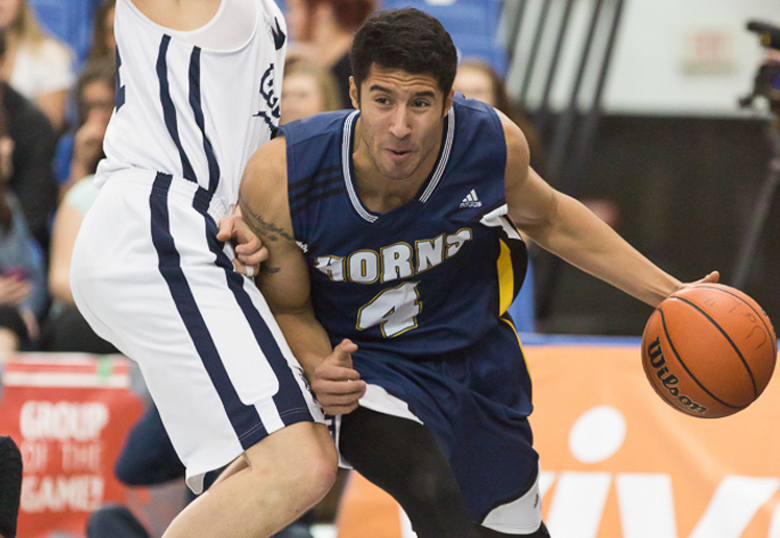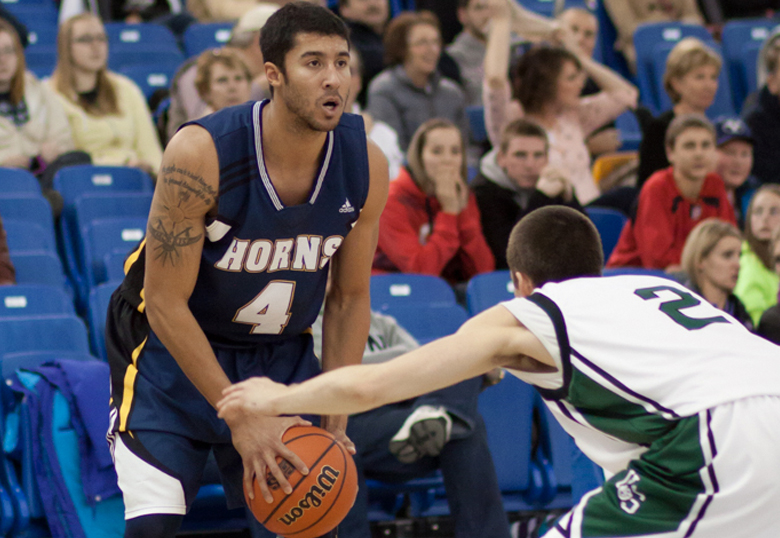University of Lethbridge alumnus Julian SpearChief-Morris (BA’13) said he was headed for law school in a 2012 video feature he shot while a member of the Pronghorns men’s basketball team.
“After I finish at the University of Lethbridge I hope to travel for a couple of years and hopefully go into law school,” he said at the time, almost matter-of-factly.

Little did we know that the distinguished graduate of the University’s urban and regional studies program would set his sights on the pre-eminent law school in North America – Harvard. Now in his second year at the venerable institution, SpearChief-Morris has made history as the first Indigenous student president of the Harvard Legal Aid Bureau. The organization has been in existence for 104 years.
“It’s an incredible honour. I think it’s great whenever you see First Nations and other Indigenous people in higher education and in positions like this,” says SpearChief-Morris. “Being at Harvard is an incredible experience. It’s a big school and the campus is very impressive but overwhelmingly it’s a humbling experience. I think that’s what I’ll take away most from this, being surrounded by the most brilliant people in the world and constantly having to hold yourself up next to those people gives you some great perspective.”
The son of an African-American father from Los Angeles and Aboriginal mother (Wilma Spear Chief (BASc ’77)) from the southern Alberta Blood Tribe, SpearChief-Morris grew up in a unique household that groomed unique talents. A gifted athlete, he was a star in the Southern Alberta High School Basketball League and, after graduating from Lethbridge Collegiate Institute, was recruited by national powerhouse University of Victoria.
While he was universally respected for his ability to run a fast break and hit a three-point shot, there was a depth to SpearChief-Morris that went far beyond the hardcourt. It was apparent early on that the student aspect of student-athlete would always remain first and the sport would help facilitate much larger goals.
“That was a vision that Jules always had in his life. Basketball was great and basketball was another place for Julian to excel but he was never a hoop dreamer, he was a person who had a very clear vision and focus about what he wanted to do with his life,” says Dave Adams, current coach of the Pronghorns women’s basketball team and former coach of the men’s program that lured SpearChief-Morris back to Lethbridge in 2009.
Adams knew him well, having watched him grow up alongside his own daughter when both were enrolled at Montessori School as toddlers. The U of L lost SpearChief-Morris to Victoria out of high school but he says he was an awkward fit there, and after two years, with Adams now at the helm of the Horns, he returned.
“Think about the fortitude and the vision he had to leave a very successful program in Victoria and come to the University of Lethbridge, which hadn’t made the playoffs in seven or eight years,” says Adams, who notes SpearChief-Morris then had to sit out the 2009-2010 season because of transfer regulations. “For him to do that speaks a lot to the character of the person and to who Julian is.”
Back on the floor for the 2010-11 season, SpearChief-Morris played just eight games before suffering a season-ending knee injury. He endured a full 10 months of rehabilitation before he finally returned to the starting lineup the next fall. His first year back, he managed to play only 15 minutes per game as he regained strength and confidence in his surgically-repaired knee. It wasn’t until 2012-13, his final year of eligibility, that the Pronghorns saw a completely healthy SpearChief-Morris and he responded averaging 15.1 points per game, second in both team scoring and rebounds.
“I believe that all the adversity that was put in front of Julian to play and to be the successful player that he was, he channeled into other aspects of his life,” says Adams. “He always surrounded himself with excellence and it gave him tools to put in his toolbox for success in life.”
All the while, SpearChief-Morris threw himself into his studies and he prospered in a new environment.
“I had such a good experience at the U of L, the small class sizes were something I really appreciated,” he says. “I had the opportunity to meet and get to know so many of my professors, many I still keep in contact with today.”
One of those professors was Dr. Ivan Townshend, coordinator of the Urban and Regional Studies program in the Department of Geography. He paints a picture of a student who saw his studies as a way to facilitate a meaningful impact on society.
“One of the reasons he stood out was you could tell he had a real social conscience and a sincere willingness to help the disadvantaged,” says Townshend. “And it wasn’t so it would just look good on his resumé, he was intent on making a real difference.”
SpearChief-Morris worked for Townshend as a research assistant for a year and clearly was at the top of his class.
“From the point of view of the urban and regional studies students I’ve seen over the last 25 years, he’s certainly one of the top 1 to 2 per cent,” he says. “He was an exceptional student, mature beyond his years. He was very unique in that he was intellectually inquisitive and an exceptionally good researcher who really grasped the material on a deep level.”
SpearChief-Morris feels strongly connected to his family and his roots. He has never wavered in his desire to better the outlook for the Aboriginal community in southern Alberta.

“I grew up in a household where it was an expectation that we’d attend some form of higher education and I was lucky to have had two parents who were there, who cared, who supported me, and who believed in me. That’s not something that a lot of Aboriginal kids have the privilege of and that privilege is not lost on me. I feel very fortunate to have had that upbringing and that’s part of the reason why I do what I do – to give back,” says SpearChief-Morris.
Upon graduating from the U of L, SpearChief-Morris spent a year as an educational assistant and guidance counsellor who specifically worked with Aboriginal children.
“That was a great experience. I saw a lot of success stories but I also felt frustrated a lot of the time because I always felt I was dealing with symptoms of a greater issue that I really didn’t have the power to address in that role,” he says. “That’s when I cemented my decision to go to law school.”
He admits he never expected to end up at Harvard but after excelling on his LSAT exam, it opened the door for him to apply. At the tail end of his first year in Boston, he was eligible to apply to one of the three historic honour societies at Harvard Law School and earned acceptance into the Harvard Legal Aid Bureau, the oldest student-run law firm in the United States.
Thanks to a specific statute in the State of Massachusetts, the bureau is allowed to practice as students in court under the supervision of instructors but as lead attorneys and attorneys of record.
“We provide pro bono legal aid to folks in the greater Boston area who couldn’t otherwise afford those services,” says SpearChief-Morris. “The Bureau is a remarkable organization. When we take on a client, we take on responsibility for the most important thing in that client’s life, and I think that forces our students to grow up a lot. You have to answer that phone call and that email, even if it’s on Christmas morning, you have to be on time, you have to be present and you have to take it seriously because it’s real.”
He will graduate in May 2018 and in the meantime, he’ll spend his second consecutive summer working for a law firm in Washington, D.C. as part of the Native American Practice Group. They represent Native American tribes in complex litigation matters, and act as government relations and economic development consultants.
And while the big cities are honing his legal skills today, a return to his hometown is the ultimate goal – continuing the work and fulfilling the promise he began years ago.
“As a second-year student I don’t have it all figured out yet but I’ve really enjoyed the work I’ve been doing in the summer and I’d like to do that moving forward, at least in the short term,” he says. “Long term, my goal has always been to go back to southern Alberta and put the experience I hope to have gained along the way to use back home.”
